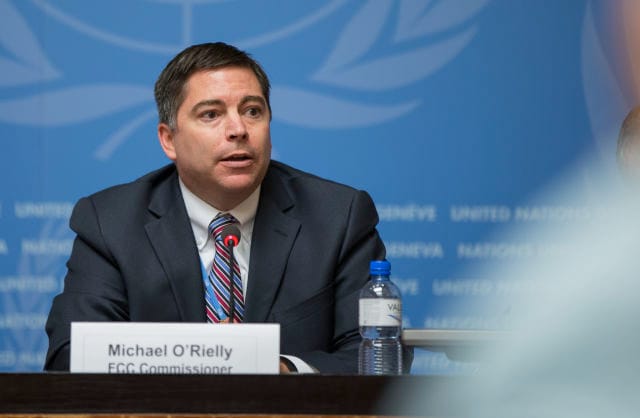Michael O’Rielly: Substantive Objections to a Government 5G Wholesale Network
Over the last few months, various ideas have been floated about the offering of 5G wireless services via a government-sponsored network. This entire effort seems convoluted and borders on the preposterous. Just the notion of the U.S. moving away from the highly-successful, private-sector led approac
Michael O'Rielly

Over the last few months, various ideas have been floated about the offering of 5G wireless services via a government-sponsored network. This entire effort seems convoluted and borders on the preposterous. Just the notion of the U.S. moving away from the highly-successful, private-sector led approach that is responsible for our country’s premier position globally would be a serious misstep. In essence, it would throw a monkey wrench into one of the greatest success stories in the history of technology. At the same time, it has been nearly impossible to nail down with any granularity what exactly is being contemplated by this new “network.” To call this effort a trial balloon is insulting to balloons, as all the ideas mentioned have far less consistency than balloons, and more closely resemble a child’s bubbles. Based on what we do know, however, the entire effort is jam-packed with insurmountable problems.
Accordingly, I’ve attempted to expose a few of the issues that someone trying to create a government-sponsored 5G network would face – no matter how it was structured – and explain why it doesn’t make logical sense. Perhaps all the rhetoric and lobbying in favor of this scheme will end once people examine some straight facts and salient arguments.
No Available Spectrum Bands
In an ever-increasingly wireless world, each megahertz is being strenuously fought over. Any effort to repurpose a commercial band to new and different uses, such as this proposed network, will not occur without a huge fight (consider, e.g., C-Band discussions). Moreover, the “easy” bands to convert for advanced wireless services have already been allocated. With that avenue essentially closed, the concept being bandied about is that this new network would be “given” spectrum from the Department of Defense’s (DoD) holdings. The most likely DoD frequencies that could be used for this purpose would be in the 3 GHz band, but DoD has already thrown up multiple roadblocks to any commercial activity in these bands as a threat to its mission. I know this well, as I’ve been advocating for a complete reallocation of the 3.45 to 3.55 GHz and portions of the 3.1 to 3.45 GHz bands for commercial use. Without spectrum, there is zero chance that such a network could even function, much less succeed. Not to mention, true 5G will require low-, mid- and high-band spectrum, so it is unlikely that this nationwide network would ever be able to realize the capacity, speeds, and latency of 5G.
Even if there were some magical band that DoD would make available, federal government agency spectrum cannot be used to offer commercial services. Therefore, the minute a commercial entity tried to use the government-sponsored wholesale network to offer services, the network and any users – not to mention the DoD – would be in violation of the law and numerous FCC rules. Good luck trying to get a private company to commit to use this wholesale network when it would be immediately subject to cease and desist orders and potential penalties from the Commission, especially since the Chairman and all Commissioners have loudly objected to this wholesale network concept from the outset. And, that is even if we get to this point, because multiple lawsuits would be filed that would bring these plans to a halt immediately. Additionally, there seems to be a very low likelihood that Congress will change the underlying laws and regulations, as relevant legislative efforts in play (e.g., bills by Senators Cruz and Cornyn) seem to be taking the discussion in the direct opposite direction.
Can’t Compel Usage
Absent interpreting current law or regulations in an incomprehensible way, there is no way to require any provider to use a wholesale wireless network. Without a mandate, it means that any use will have to be completely voluntary. Given nationwide providers’ alternative plans to roll-out 5G services and their objections to this network, they clearly have zero interest in using it. And, these are the reactions before we even have clear guidance on how access to this wholesale network would be determined. Without the bigger providers’ participation, use and financial support for this new system would be left to regional providers, smaller entities, and/or new entrants. It is possible that some of these might be willing to use such a network, but their traffic load is likely to be incredibly low and wouldn’t make the overall economics work. Moreover, their usage patterns would likely peak in specific locations and not others. Yet a massive network infrastructure would have to be constructed for multiple reasons, including security (see below), notwithstanding the overall demands for its use. And, if there are new entrants who can use the capacity of and support such a network, they are also free to acquire spectrum like any other commercial entity, instead of getting a government handout.
No Tower Agreements/Relationships
Almost all wireless towers and antenna locations are owned or leased by companies unaffiliated with the large wireless providers. However, the existing contractual relationships and uncertainty surrounding the viability of this random wholesale network model means that it is unlikely that the current wireless infrastructure would be available for this purpose. To the extent collocation is not an option, that leaves constructing new towers and contracting for new antenna sites. This would make such a network build – starting from the ground up – astronomically expensive. In fact, other current spectrum holders have admittedly decided not to take this approach. It would also take a very long time, if ever, to execute these agreements and finish construction, which would increase the likelihood that any nationwide network and, more importantly the dedicated spectrum, would be underutilized if this plan was ever to be put in motion. This endeavor is not unlike plans of the recently bankrupt Alliance of American Football and its backers’ efforts to build a new professional football league from the ground up; jumping to the punchline, the vision lasted all of six weeks.
Won’t Ensure Security
One of the main reasons given for the creation of a government-sponsored wholesale network is that it is the only mechanism to secure 5G communications from interceptors and those with nefarious intentions. This line of thinking is flawed for at least two reasons. First, it assumes that private sector wireless providers don’t care about security or can’t ensure sufficient security, which just isn’t accurate. These companies have been and continue to work hard within the standard-setting bodies to incorporate security within the various 5G standard iterations. That means the protocols adopted have and will promote extensive security efforts. More importantly, these same providers know quite well that users expect security when using their networks. Thus, they have every incentive and are pursuing the appropriate steps to ensure robust, secure communications, especially in a 5G universe.
Second and equally flawed is the idea that any network, especially this wholesale one, can be completely secure. To guarantee security of the overall system, no data can be handed off to another carrier or carried by the public Internet. In other words, this network must carry all its traffic from end to end, especially in a 5G universe where computing will be diffuse and not centralized, generating unlimited exposure points. Siting wireless facilities nationwide is expensive enough but building separate fiber and backhaul systems from scratch is practically undoable. Even if this were possible, which it is not, there would be intense interest in breaking into and exploiting its communications. It effectively would be an engraved invitation for any rogue entity seeking to undermine the U.S. government’s sponsorship of the network. Also, arguing that this network couldn’t be broken into ignores the reality of past breaches of high priority U.S. government networks (e.g., DoD, CIA).
Won’t Stop China’s Global Expansion
For those worried about the communist Chinese government’s influence and resulting harmful effects, it is nearly impossible to see how hamstringing the U.S. market with a government-sponsored network will convince other countries to take similar action. Shooting oneself in the foot rarely leads others to do the same. In fact, there is no evidence showing how and no plausible argument as to why taking such a drastic step would sever other nations’ installation of Chinese equipment in their networks or curtail Chinese wireless providers from gobbling market share as they move from country to country. More problematic, there is a likelihood that the U.S.’s pursuit of such a curious path — with its added costs, extensive buildout timelines, and suspect security improvements — would drive other nations to increase their reliance on what has typically been cheaper-priced Chinese communications equipment, placing Chinese manufacturers and providers in a stronger position than those in the U.S. and other market-based countries. And, it is fairly conceivable that the Chinese government would counter our action with even more subsidies. Instead of curtailing China’s 5G global position, it may act as a further catalyst.
Government Undermining Private Sector Wireless Market
The establishment of such a wholesale 5G network would unfairly and inappropriately provide a U.S. government imprimatur over those of the private sector. This is not too dissimilar to the debate decades ago over whether there should be a government-sponsored national U.S. bank. While I have little doubt that our nation’s existing wireless providers could compete and succeed against this new network model, just the mere threat of giving this “idea” serious consideration might have negative repercussions. For instance, it might improperly increase providers’ risk for customer loss, especially government agency traffic; potentially initiate review of their borrowing costs; and generate negative public perception of their network security. Creating unnecessary doubt and market uncertainty for the private sector is a serious unintended consequence of continuing to even have the debate over this network.
On a larger scale, such a government stamp-of-approval combined with free DoD spectrum would send a signal that we are not fully committed to American capitalism. At this precarious moment in time and with global economic uprisings on the rise, this slice of socialism sends exactly the wrong signal to the rest of the world.
* * *
Given all the issues identified, a major question remains: why in the world would we gamble our nation’s strong wireless position for a less than half-baked, flawed idea? Certainly, it makes little sense to give it any credence or pursue it in any capacity — at least until definitive solutions to the issues above and potentially others are presented. I won’t hold my breath that any attempt will be made to provide any specifics or to answer the unanswerable.
Michael O’Rielly has been a Commissioner at the Federal Communications Commission since October 2013.
BroadbandBreakfast.com accepts commentary from informed observers of the broadband scene. Please send pieces to commentary@broadbandcensus.com. The views reflected in Expert Opinion pieces do not necessarily reflect the views of BroadbandBreakfast.com and Breakfast Media LLC. This article was originally published on FCC.gov.









Member discussion